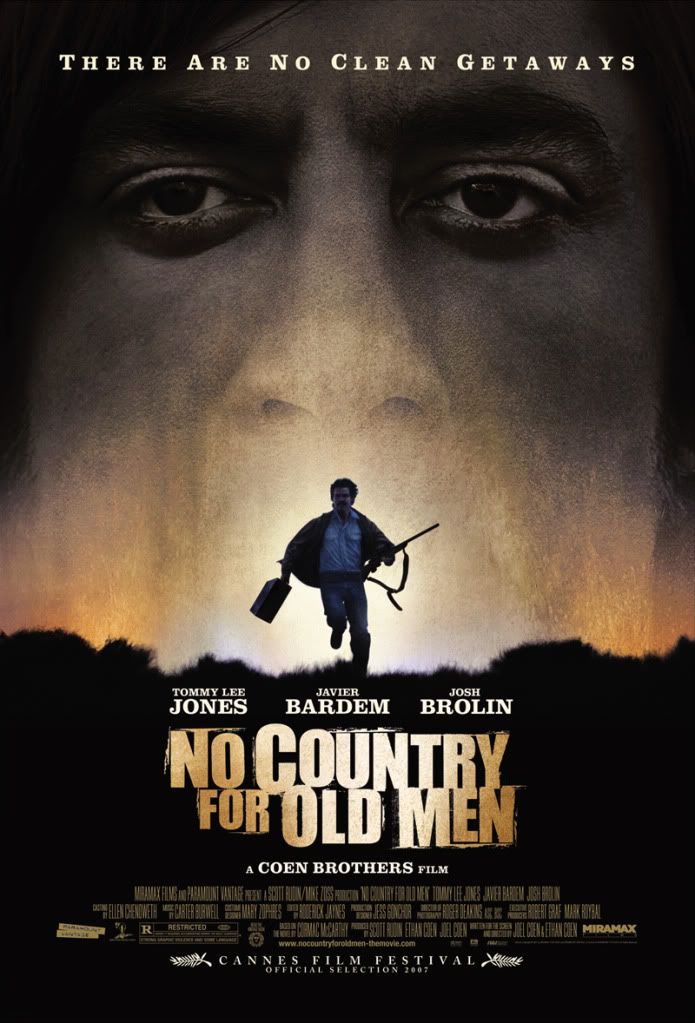Title: No Country for Old Men
Director: Ethan Coen & Joel Coen
Language: English
Year: 2007
Critical Reception: Oscars Best Picture winner
Psych Index: Existential, Antisocial Personality Disorder
In Brief:
Be it a reconstructed tale or a cautionary post-modern warning, No Country for Old Men resonated beyond the literal, though it very much rooted its success in the Coen brothers' ability to handle the visceral so effortlessly. Everything seemed deliberate but not forced, violent but not pornographically so, bleak but not without a sense of humour. Despite its plot line, this was less a film about crime and some psychopathic killer than it was about what people would do in face of meaningless happenstances and luck-of-the-draw absurdities. It may not always end up happily, but it would at least speak to one's character and sense of place. Unfortunately, only some would be wise enough to quit the scene before the real mess would begin, and many would continue to march on - perhaps with ample greed and little sense of place to help them save themselves, much less their loved ones.
Comment (SPOILERS ALERT):
When No Country for Old Men first screened in North America, there was a lot of head scratching after the credits rolled. I’d argue that everything you needed to know about the film was right there in the film, specifically in Ed Tom Bell’s (Tommy Lee Jones) speeches. Here, I’ll summarize the film with three quotes taken directly from the film. SPOILERS ALERT.
First, the beginning monologue that laid the foundation for the emotional and philosophical tone of the film:
I was sheriff of this county when I was
twenty-five. Hard to believe. Grandfather
was a lawman. Father too. Me and him was
sheriff at the same time, him in Plano
and me here. I think he was pretty proud
of that. I know I was.Some of the old-time sheriffs never even
wore a gun. A lot of folks find that hard
to believe. Jim Scarborough never carried
one. That the younger Jim. Gaston Boykins
wouldn’t wear one. Up in Commanche County.I always liked to hear about the old-
timers. Never missed a chance to do so.
Nigger Hoskins over in Batrop County knowed
everybody’s phone number off by heart. You
can’t help but compare yourself against the
old timers. Can’t help but wonder how they
would’ve operated these times. There was
this boy I sent to Huntsville here a while
back. My arrest and my testimony. He killed
a fourteen-year-old girl. Papers said it
was a crime of passion but he told me there
wasn’t any passion to it.Told me that he’d been planning to kill
somebody for about as long as he could
remember. Said that if they turned him
out he’d do it again.Said he knew he was going to hell. Be
there in about fifteen minutes. I don’t
know what to make of that. I surely don’t.The crime you see now, it’s hard to even
take its measure. It’s not that I’m afraid
of it.I always knew you had to be willing to
die to even do this job – not to be
glorious. But I don’t want to push my
chips forward and go out and meet some-
thing I don’t understand.You can say it’s my job to fight it but
I don’t know what it is anymore.…More than that, I don’t want to know. A
man would have to put his soul at hazard.… He would have to say, okay, I’ll be
part of this world.
Second, an explanation for what seemed to be the resignation that followed an anti-climatic end to the chase, as Bell realized he could no longer put his chips forward to face things unknown:
I don’t know. I feel overmatched.
…I always thought when I got older
God would sort of come into my life
in some way. He didn’t. I don’t blame
him. If I was him I’d have the same
opinion about me that he does.
Finally, the happy, comforting conclusion to the film that some might have missed:
Okay. Two of ‘em. Both had my father.
It’s peculiar. I’m older now’n he
ever was by twenty years. So in a sen-
se he’s the younger man. Anyway, first
one I don’t remember so well but it
was about money and I think I lost it.
The second one, it was like we was
both back in older times and I was on
horseback goin through the mountains
of a night.…Goin through this pass in the moun-
tains. It was cold and snowin, hard
ridin. Hard country. He rode past me
and kept on goin. Never said nothin
goin by. He just rode on past and he
had his blanket wrapped around him and
his head down……and when he rode past I seen he
was carryin fire in a horn the way
people used to do and I could see the
horn from the light inside of it.
About the color of the moon. And in
the dream I knew that he was goin on
ahead and that he was fixin to make a
fire somewhere out there in allthat
dark and all that cold, and I knew
that whenever I got there he would be
there. Out there up ahead.
This was not to say that there was nothing in between. The point was not to mull over the state of the world in so many words, but to feel the weight of the land, of the troubles people face, and of the random luck-of-the-draw. For that, you’d have to watch the film and not this 3-quote summary. Or read the book, whichever suits you well.
Clip:
 Subscribe
Subscribe


2 Response to No Country for Old Men: A Summary In 3 Quotes
Post a Comment